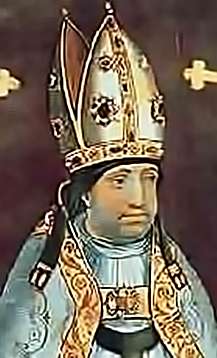Rodrigo Jiménez de Rada

_primera_p%C3%A1gina.png)
Rodrigo Jiménez (or Ximénez) de Rada (c. 1170 in Puente la Reina, Navarre, Spain – 10 June 1247 on the Rhone, near Lyons, France), also known as Archbishop Don Roderic of Toledo,[1] was a Navarrese-born Castilian Roman Catholic bishop and historian.
He was born from a Navarrese noble family and was educated by his uncle, Martín de la Finojosa, abbot of Saint Mary of Huerta and bishop of Sigüenza. He studied Law and Theology in the Universities of Bologna and Paris. When he returned to Navarre he mediated between that kingdom and Castile and he became friend of King Alfonso VIII of Castile, who nominated him as bishop of Osma and later put pressure on the chapter of Toledo to elect him as archbishop of Toledo. His election as archbishop of Toledo was confirmed by Pope Innocent III on 12 February 1209. In addition, Alfonso VIII appointed him as major chancellor of Castile.
He played a key role in the war against the Almohads and at the battle of Las Navas de Tolosa (1212). He was the moral leader of that war, which was considered in Europe as a crusade in which many European knights took part. He sent afterwards missionaries to Morocco. His archbishopric gained a lot of possessions throughout the Guadalquivir valley, especially around Quesada and received further generous donations from kings and lords.
As archbishop of Toledo, he promoted the building of the cathedral and placed the first stone in 1226 (it was not completed until 1493), restored the dioceses of Baeza and Córdoba after the Christian conquest of those cities and defended the primacy of his see in Spain against the pretensions of Braga and Santiago.
He promoted the cultural life of Toledo, a city that was the cultural entrepôt of Christian and Muslim civilizations during the Middle Ages. He ordered the translation of the Koran to Latin and composed a wide historiographic work. His De rebus Hispaniae, a general history of Spain, was very soon translated into Spanish and was very influential on the General History of Alfonso X.
He died near Lyons while returning from a visit to the pope, and is interred in the monastery of Saint Mary of Huerta.
Writings
- De rebus Hispaniae[2][3]
- Hunnorum, Vandalorum et Silingorum Historia
- Ostrogothorum Historia
- Historia Romanorum
- Historia Arabum
See also
Bibliography
- Gorosterratzu, Javier: D. Rodrigo Jiménez de Rada. Gran estadista, escritor y prelado, Pamplona: Imprenta Vda. de T. Bescansa, 1925
- Roderici Ximenii de Rada opera omnia (ed. by Juan Fernández Valerde), Turnhout: Brepols, 1992–1993
- Adro, Xavier: Rodrigo Jiménez de Rada. Estadista y artífice, siglo XIII, Barcelona: Casals, 1989
- Pérez de Rada, Francisco Javier: El arzobispo don Rodrigo Jiménez de Rada, Madrid: Fundación Jaureguízar, 2002
- Pick, Lucy: Conflict and coexistence. Archbishop Rodrigo and the Muslims and Jews of Medieval Spain, Ann Arbor: University of Michigan, 2004
References
- ↑ History of slave trade, Volume I p.22 "...as wrote the Archbishop Don Roderic of Toledo"
- ↑ (Spanish) Digitalized manuscript of the University of Seville: Jiménez de Rada, Rodrigo . Crónica de España por el Arzobispo de Toledo Don Rodrigo Jiménez de Rada, traducida al castellano y continuada por Don Gonzalo de la Hinojosa, Obispo de Burgos, y después por un anónimo hasta 1430. Manuscrito. 14??. A 331/143
- ↑ Modern Spanish edition: Historia de los hechos de España (translated and edited by Juan Fernández Valverde), Madrid: Alianza, 1989
|